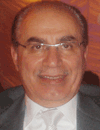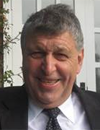Wednesday, 20 July 201108:00 | Registration | |
Session: Cell Culture - Process Optimisation, Timeline Reduction and New Approaches |
| | 09:00 |  | Keynote Presentation Life, Stress and Death in the Bioreactor
Mohamed Al-Rubeai, Director, University College Dublin, Ireland
The presentation will examine how such molecular and engineering understanding of in vitro culture is helping to solve important problems in mammalian cell culture to optimise therapeutic protein productivity. |
| 09:30 | Unraveling Lipid Metabolism of Packaging Cells:Towards Improved Manufacture Of Retroviral Based Biopharmaceuticals
Ana Coroadinha, Head, IBET/ITQB UNL, Portugal
The production of enveloped virus imposes specific metabolic requirements. In this work, a functional genomics approach was used to unveil the main metabolic constraints in retrovirus production. | 10:00 | Automation of Cell Line Generation for Production of Recombinant Antibody Mixtures
Dietmar Weilguny, Principal Scientist, Symphogen A S, Denmark
Symphogen has introduced robotic handling of mammalian cell suspension cultures. This presentation will focus on the processes and challenges encountered during the establishment of a flexible and affordable automated platform for tracing and handling of medium size suspension cultures. | 10:30 | Coffee Break and Networking in the Exhibition Hall | 11:15 | MicroRNAs: New Targets for Improving CHO Cells as Protein Factories
Colin Clarke, Research Scientist, Dublin City University, Ireland
MicroRNAs have emerged as a potential route for engineering Chinese hamster ovary (CHO) cells to enhance industrially beneficial phenotypes. This presentation will give an overview of the current state-of-the-art in the field. | 11:45 | Ubiquitous Amino Acid Transporters Expressed During CHO Cell Culture
Sarantos Kyriakopoulos, Research Scientist, Imperial College London, United Kingdom
Amino acids are important constituents of mammalian cell culture media. However, their uptake has not been studied in detail. To this effect the amino acid transporters that appear to be ubiquitously expressed in all kind of tissues were studied during the exponential, stationary and decline phases of CHO batch cell culture using qRT-PCR. | 12:15 | Lunch and Networking in Exhibiton Hall | 13:15 | Poster Viewing Session | 14:45 | Tracking Changes in Biomass using Focussed Beam Reflectance Measurement (FBRM)
Jessica Whelan, Postdoctoral Researcher, University College Dublin, Ireland
The potential of focussed beam reflectance measurement as a tool for the online monitoring of biomass concentration was investigated in plant, microbial and mammalian cell systems. | 15:15 | Coffee Break and Networking in the Exhibition Hall | 16:00 | Making Light Deliver. Photoporation the Ability to Transfect and Inject Cells with Light
Rob Marchington, Research Fellow, St Andrews University, United Kingdom
We have developed novel methodology for laser induced optical transfection of both adherent and non-adherent mammalian cells. Our technology has allowed us to transient transfect a range of different cell types including stem cells, with DNA, mRNA or iRNA. We have also developed prototype devices which will allow us to transfect cells both in microfluidic formats but also endoscopical. | |
Session: Formulation Techniques |
| | 16:30 | The Importance of Formulation for the Proof of Concept and for the Success of Biopharmaceuticals
Tudor Arvinte, Chairman and CEO, Therapeomics Inc/University of Geneva, Switzerland
One possibility to increase the success rates of new biotech drugs is to improve the formulation. In early stages projects may die due to the use of not optimized protein formulations and the failure is falsely attributed to the molecule instead. The investment in a good proof-of-concept, enabling formulation, is minimal compared with the risk that companies are taking in performing human studies with non- optimized formulations. | 17:00 | High Throughput Formulation and Analysis of Biologics
Martinus Capelle, Senior Scientist and Project Manager, Therapeomic Inc, Switzerland
Novel high throughput methods will be presented for the formulation and analysis of proteins. The focus will be on studying the physical stability of biologics at both low and high concentrations. The complexity of experimental design and data analysis will be illustrated in case studies. | 17:30 | Improved Formulation Technologies
Oksana Leszczyszyn, Product Technical Specialist for Separations, Malvern Instruments Ltd, United Kingdom
Pre-clinical development of biopharmaceutical drugs follows a well-defined pipeline, where the formulation and activity of biotherapeutic agents must be fully characterised at each stage. We present applications of light scattering techniques that offer solutions to assessing stability, aggregation and structure. | 18:00 | Drinks Reception |
Thursday, 21 July 201109:00 |  | Keynote Presentation Cell Line Misidentification
John Masters, Professor, University College London, United Kingdom
This talk will address the issue of cross-contamination of human cancer cell lines, indicating the history of the problem and how it can be quality-controlled using STR profiling. |
| |
Session: Cell Culture Therapeutic Developments and Novel Research |
| | 09:30 | Activity of Anti-Cancer Agents in a Three-Dimensional Cell Culture Model
Sanjit Nirmalanandhan, Research Assistant Professor, University of Kansas Medical Center, United States of America
A review of different 3D tissue model systems and pharmacological responses of these systems to known anti-tumor agents will be discussed. | 10:00 | Production of Antibody Mixtures from Single Clonal Cells
Cecile Geuijen, Director, Merus Biopharmaceuticals, Netherlands
Oligoclonics™ are mixtures of conventional and bispecific human monoclonal antibodies(hu-mAbs) that bind to different epitopes of single or multiple targets and are produced by a clonal cell. These mixture, represent next-generation biopharmaceuticals with improved efficacy and are based on hu-mAbs that share the same, identical germline-encoded light chain. Merus has developed production technology and analytical tools for the efficient manufacturing and detailed characterization of Oligoclonics™. The generation of OligoclonicsTM and developmental and regulatory aspects of this new format with be discussed. | 10:30 | Coffee Break and Networking in the Exhibition Hall | 11:15 | Culture of CHO Cells for the Transient Expression of Recombinant Antibodies
Teresa Byrne, Manager, Fusion Antibodies Ltd, United Kingdom
Transient transfection in Chinese Hamster Ovary cells (CHO) is a rapid method to express mg-g quantities of protein required for proof of concept experiments. High level protein expression in CHO cells requires optimisation of a number of transfection parameters. Many of these parameters have been tested at Fusion Antibodies and will be discussed in this talk. | 11:45 | Metabolic Engineering of CHO cells for Production of Heparin: New Paradigms for Glycoengineering
Susan Sharfstein, Associate Professor, University of Albany, United States of America
Heparin, the most widely used anticoagulant drug, is currently purified from animal sources with the attendant risks of biological and chemical contamination. To alleviate these risks, we are attempting to synthesize heparin in Chinese hamster ovary (CHO) cells by metabolically engineering the necessary enzymes for heparin biosynthesis. This presentation will discuss our progress and advances we have made in understanding heparin biology and strategies to engineer glycan pathways in CHO cells. | 12:15 | Lunch and Networking in Exhibition Hall | 13:30 | Poster Viewing Session | |
Session: Developments in Stem Cell Culture |
| | 14:30 | The Scale-Up of Human Embryonic Stem Cell Culture
Christopher Hewitt, Professor, Loughborough University, United Kingdom
The unique challenges for the scale-up of stem cell cultures whilst in some way analogous to those already developed for mammalian cells at large scales, are very different and these will be discussed here. | 15:00 | Good Cell Culture Practice and Stem Cells
Lyn Healy, Senior Stem Cell Biologist, National Institute for Biological Standards and Control, United Kingdom
Good Cell Culture Practice is essential to the process of cell banking. This practice is being embraced by more and more laboratories and this in turn will lead to more reliable, reproducible in vitro testing. | 15:30 | Coffee Break, Networking in the Exhibition Hall and Close of Conference |
|
